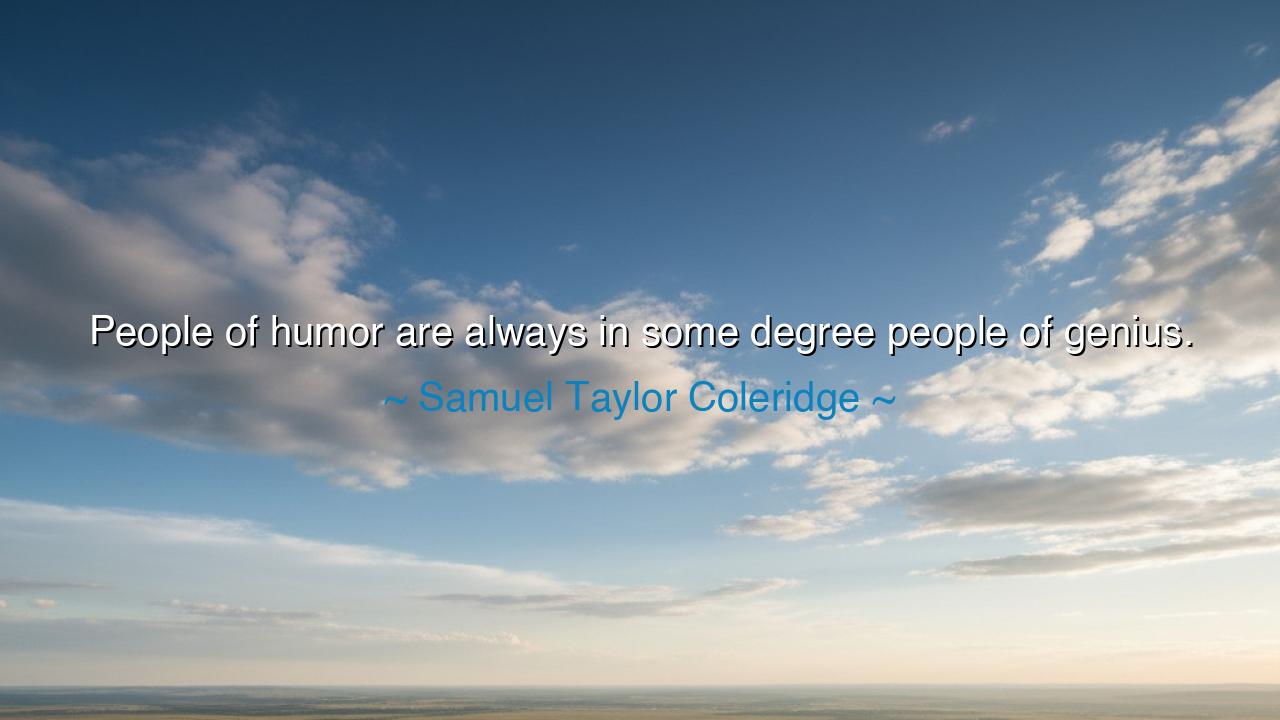
People of humor are always in some degree people of genius.






In the vast expanse of human endeavor, where the light of wisdom shines in varied forms, there is one quality that stands as a beacon of both intellect and creativity—the gift of humor. Samuel Taylor Coleridge, that great poet and philosopher, spoke of it with great insight when he said, "People of humor are always in some degree people of genius." And so it is, for humor—that spark of wit, that unexpected twist of understanding—has long been a companion of the profound, the insightful, the visionary. It is not a mere trick of jest, but a force that cuts through the veil of ordinary perception, revealing truths that are hidden from the mundane eye.
Humor, as Coleridge observed, is not simply a tool for amusement; it is a hallmark of genius. It requires the mind to see beyond the surface, to recognize the contradictions and paradoxes that others overlook. The true humorist, like the great sages of old, must possess the ability to see the world in all its complexity and to render that complexity in a form that both delights and instructs. It is the genius of the humorist to take the serious and transform it into the absurd, to take the mundane and imbue it with meaning. Thus, humor is not an escape from reality but a more profound engagement with it, a reflection of the deep intelligence required to navigate the complexities of life.
Let us look to the great figures of history, those whose humor has endured alongside their wisdom. Take Socrates, that ancient philosopher whose words still echo through the ages. He was known for his wit, his sharp tongue, and his ability to turn the most serious philosophical questions into objects of playful inquiry. Yet, beneath the humor lay profound insight. Socrates used humor not to diminish truth, but to uncover it, to make his audience think, to break through the rigid structures of thought that limited their understanding. Through humor, Socrates showed that wisdom was not a somber pursuit but a dynamic, ever-evolving conversation. In this way, his humor was the very essence of genius—an invitation to deeper thought, a way to engage the world with both intellect and joy.
Similarly, we find in the wit of Shakespeare, that towering genius of the stage, an example of how humor reveals the complexities of human nature. Through his characters—whether the fool in King Lear or the witty servants of Twelfth Night—Shakespeare used humor not merely to entertain, but to illuminate the contradictions, the flaws, and the beauties of human existence. His humor was never shallow; it was a tool of wisdom, a way to expose the human soul in all its fragility and magnificence. Through his mastery of humor, Shakespeare revealed the genius of human nature itself, making us laugh while simultaneously making us reflect on our own lives.
The genius of humor is not just the ability to make others laugh; it is the ability to make others see. Consider the Sufis, the mystical thinkers of the Islamic world, who often used humor in their spiritual teachings. The great poet Rumi understood that the divine is not always to be found in the solemnity of ritual, but in the playfulness of life. Through his witty verses, he invited his followers to see the world differently, to laugh at the very things that once seemed most serious. Rumi’s humor was a doorway into deeper spiritual understanding, a way of showing that the divine can be found in the most unexpected places, in the paradoxes and absurdities of existence.
In this, Coleridge’s wisdom rings clear: those who possess humor possess a deeper genius, a wisdom that does not merely analyze the world, but sees through it, revealing its hidden layers. The humorist, like the poet or the philosopher, must have the ability to stand at the crossroads of light and darkness, to see both the joy and the sorrow that permeate existence, and to reflect that vision back to the world. It is a special gift, one that transforms the ordinary into the extraordinary, the everyday into the sacred. Humor is not the absence of seriousness, but the presence of profound understanding, a way of connecting to the world in a deeper, more meaningful way.
And so, let us take this lesson to heart. Cultivate humor in your own life, not as a mere escape from the world’s troubles, but as a means of engaging with them. Learn to see the humor in the everyday, in the challenges that seem insurmountable, in the contradictions that perplex you. For in doing so, you will not only lighten your spirit but deepen your understanding. And in that understanding, you may just find that you have touched the very genius of the world itself. For, as Coleridge reminds us, humor and genius are bound together, and the more we embrace humor, the more we embrace the very essence of wisdom. Let your life be filled with both laughter and learning, and in that harmony, you will find the key to the greatest truths.






AAdministratorAdministrator
Welcome, honored guests. Please leave a comment, we will respond soon